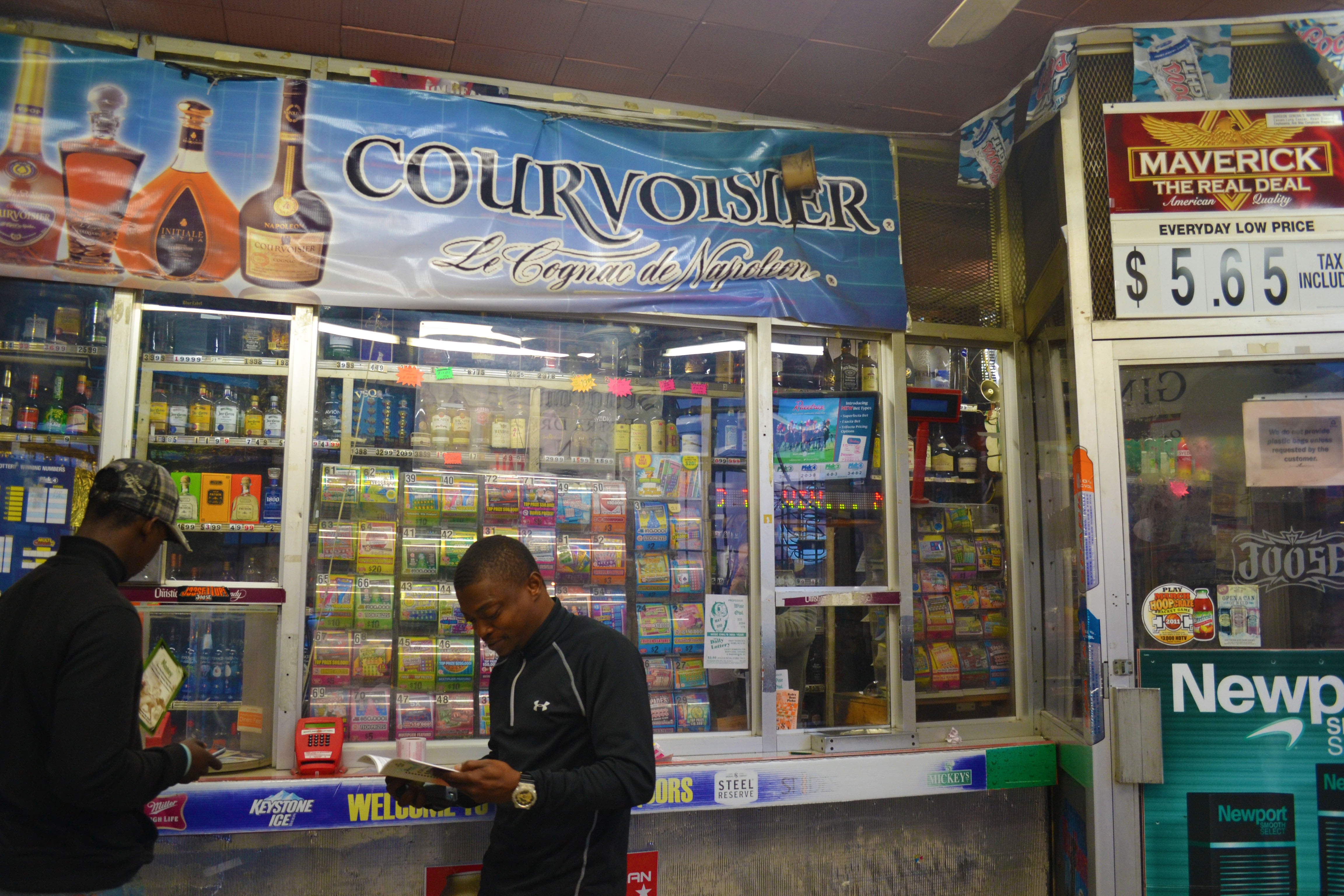Photo above: Patrons wait to buy lottery tickets at a Park Heights liquor store and lottery retailer. Capital News Service photo
By Harper Wayne
Capital News Service
 Joe Thomas is trying his luck on a slot machine at the Maryland Live! Casino at Arundel Mills.
Joe Thomas is trying his luck on a slot machine at the Maryland Live! Casino at Arundel Mills.
He explains that he used to stand in line for state lottery tickets but switched to the slots after the state’s third and largest casino opened its doors in Anne Arundel County in June 2012. He has his choice of nearly 5,000 machines.
“I’ve moved onto bigger and better things,” he said.
There is growing evidence that many others are doing the same.
State lottery revenue dropped for the first time in 16 years — $1.7 billion, or 2 percent, in fiscal 2013. The state budget predicts another drop this year.
The “likely cause is the increased competition from casinos,” according to a Maryland General Assembly budget analysis. Another state report found what “appears to be a direct correlation” between a drop in instant ticket sales and retailers’ proximity to a casino.
Maryland Live! is in a part of the state with a large population of vendors: More than half of the state’s approximately 4,000 lottery retailers are within 20 miles of the casino.
Many of those affected are small businesses, like Monaghan’s Pub in Gwynn Oak, Baltimore County, about 18 miles from Maryland Live! Jack Milani, a partner at the pub, said he had more customers before the casino opened.
“Since then, there’s been a drop off. And the people who would play scratch-offs and the people who would play Keno, you’re not seeing them as often,” he said. “The instant-type gratification games are way off for everybody.”
Salaries at stake
A Capital News Service analysis of lottery data showed that Monaghan’s Pub’s ticket sales dropped 10 percent — from $1,079,747 in 2012 to $970,523 in 2013. The biggest drops were in Keno (23 percent) Multi Match (18 percent) and Mega Millions (15 percent).
“None of this is a surprise,” Milani said. “The lottery knew this was going to happen, and I think they just didn’t expect it to be this dramatic.”
He hasn’t had to lay off any employees, he said, but if numbers continue to drop, he may have to cut down on his employees’ hours.
“There’s no other way around it. You can’t continue to spend the same amount on labor if the work isn’t there.”
Big casino corporations vs. small retailers
Maryland Live! is owned by The Cordish Cos., a privately owned multimillion-dollar business. The other four casinos and two new ones opening in the next two years also are owned by major corporations.
The primary distributors of lottery tickets are “independent and corporate retailers comprised principally of grocery and convenience stores, package goods stores, and restaurants,” according to the 2012-2013 financial report for the State Lottery and Gaming Control Agency, which regulates both lotteries and casinos.
The Maryland state lottery has been around since 1973, after voters approved a constitutional amendment allowing it. In 2010, Maryland’s first two casinos opened in Cecil and Worcester counties.
But the impact on lottery sales wasn’t felt until the opening of Maryland Live!, the largest casino and also the first casino located in the Washington-Baltimore population corridor.
Maryland’s fifth casino is scheduled to open in Baltimore later this year, and a sixth is planned in Prince George’s County in 2016.
Baltimore and Prince George’s County are the top two jurisdictions for lottery sales in the state. The Horseshoe Casino in Baltimore is expected to have a significant impact on lottery sales in 2015, according to a recent report by the Maryland Board of Revenue Estimates.
“Taking it on the chin”
“I’m hoping that next year, when they look at this report that they realize that the retailers are the ones who are really taking it on the chin,” Milani said.
Thomas, the slot-machine player at Maryland Live!, said he bought lottery tickets nearly every day from local convenience stores. He recalls buying scratch-off tickets the most often and would occasionally test his luck at Keno.
“I would go to different liquor stores near my house all the time because I thought it was more strategic to get tickets from multiple places,” he said. “While I was there I’d usually get something else – could be anything from a candy bar to a six pack – but my main reason for going was always for a lottery ticket.”
He said he can’t remember the last time he bought a lottery ticket. “Must be at least a year ago,” he said.
“I bought lottery tickets because I wanted to win money, and it was easy,” he said. “But when [Maryland Live!] opened, I could win money just as easily on a slot machine, and I could also get free drinks and hang out with friends. So all the money I spent on lottery tickets, I started spending at the casino.”
Marissa Delawder said she visits the Maryland Live! about once every three months to play slots. Before the casino opened, she bought lottery tickets more frequently than she does now, she said.
Now, Delawder said, “I seldom buy lottery tickets, because coming to the casino is just a lot more exciting…Here, you get to see your money go up and down. It’s like a game. With a scratch-off, you buy it and that’s it.”
Lejla Sarcevic contributed to this article.





Surprise ! Surprise !
No surprise here. Will Maryland Live take a hit when the Horseshoe opens in downtown Baltimore? City lottery sales will, that’s a given. But remember, it’s for “the children.” I agree with the Comptroller, gambling is a “fiscal fairy tale.”